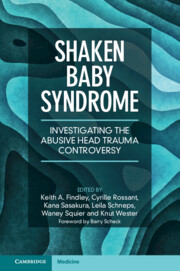Book contents
- Shaken Baby Syndrome
- Shaken Baby Syndrome
- Copyright page
- Dedication
- Contents
- Foreword
- About This Book
- Abbreviations
- Section 1 Prologue
- Section 2 Medicine
- Section 3 Science
- Section 4 Law
- Section 5 International
- Section 6 Postface
- Chapter 27 Conclusion
- Appendix: Frequently Repeated Claims concerning Shaken Baby Syndrome
- Index
- Plate Section (PDF Only)
Chapter 27 - Conclusion
from Section 6 - Postface
Published online by Cambridge University Press: 07 June 2023
- Shaken Baby Syndrome
- Shaken Baby Syndrome
- Copyright page
- Dedication
- Contents
- Foreword
- About This Book
- Abbreviations
- Section 1 Prologue
- Section 2 Medicine
- Section 3 Science
- Section 4 Law
- Section 5 International
- Section 6 Postface
- Chapter 27 Conclusion
- Appendix: Frequently Repeated Claims concerning Shaken Baby Syndrome
- Index
- Plate Section (PDF Only)
Summary
In 1971 Dr Norman Guthkelch hypothesised a causal link between shaking infants, a relatively common practice in the UK at the time, and findings of retinal and subdural haemorrhage with no or minimal of trauma (see Chapter 2). The link between shaking and a ‘triad’ of retino-dural haemorrhage and encephalopathy would come to be known as shaken baby syndrome (SBS). This book has taken a broad overview and analysis of the state of SBS, addressing global medical, scientific, social, and legal aspects of the determination.
- Type
- Chapter
- Information
- Shaken Baby SyndromeInvestigating the Abusive Head Trauma Controversy, pp. 397 - 399Publisher: Cambridge University PressPrint publication year: 2023



